一般将来时试题及答案
- 格式:doc
- 大小:66.50 KB
- 文档页数:9
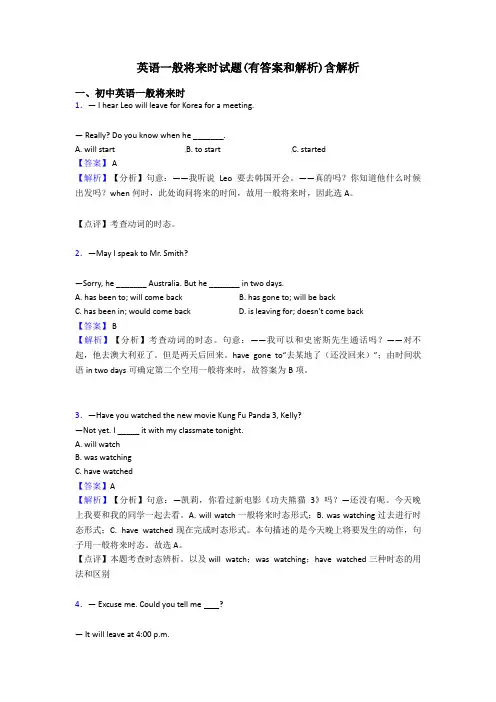
英语一般将来时试题(有答案和解析)含解析一、初中英语一般将来时1.— I hear Leo will leave for Korea for a meeting.— Really? Do you know when he _______.A. will startB. to startC. started【答案】 A【解析】【分析】句意:——我听说Leo要去韩国开会。
——真的吗?你知道他什么时候出发吗?when何时,此处询问将来的时间,故用一般将来时,因此选A。
【点评】考查动词的时态。
2.—May I speak to Mr. Smith?—Sorry, he _______ Australia. But he _______ in two days.A. has been to; will come backB. has gone to; will be backC. has been in; would come backD. is leaving for; doesn't come back【答案】 B【解析】【分析】考查动词的时态。
句意:——我可以和史密斯先生通话吗?——对不起,他去澳大利亚了。
但是两天后回来。
have gone to“去某地了(还没回来)”;由时间状语in two days可确定第二个空用一般将来时,故答案为B项。
3.—Have you watched the new movie Kung Fu Panda 3, Kelly?—Not yet. I _____ it with my classmate tonight.A. will watchB. was watchingC. have watched【答案】A【解析】【分析】句意:—凯莉,你看过新电影《功夫熊猫3》吗?—还没有呢。
今天晚上我要和我的同学一起去看。
A. will watch一般将来时态形式;B. was watching过去进行时态形式;C. have watched现在完成时态形式。
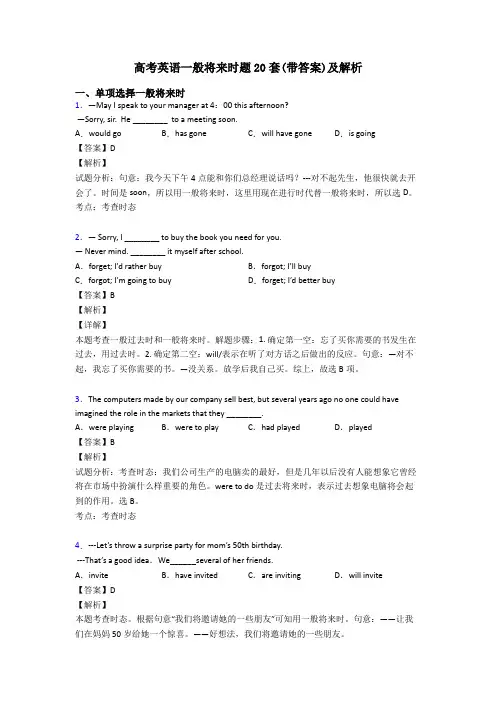
高考英语一般将来时题20套(带答案)及解析一、单项选择一般将来时1.—May I speak to your manager at 4:00 this afternoon?—Sorry, sir. He ________ to a meeting soon.A.would go B.has gone C.will have gone D.is going【答案】D【解析】试题分析:句意:我今天下午4点能和你们总经理说话吗?---对不起先生,他很快就去开会了。
时间是soon,所以用一般将来时,这里用现在进行时代替一般将来时,所以选D。
考点:考查时态2.— Sorry, I ________ to buy the book you need for you.— Never mind. ________ it myself after school.A.forget; I’d rather buy B.forgot; I’ll buyC.forgot; I’m going to buy D.forget; I’d better buy【答案】B【解析】【详解】本题考查一般过去时和一般将来时。
解题步骤:1. 确定第一空:忘了买你需要的书发生在过去,用过去时。
2. 确定第二空:will/表示在听了对方话之后做出的反应。
句意:—对不起,我忘了买你需要的书。
—没关系。
放学后我自己买。
综上,故选B项。
3.The computers made by our company sell best, but several years ago no one could have imagined the role in the markets that they ________.A.were playing B.were to play C.had played D.played【答案】B【解析】试题分析:考查时态:我们公司生产的电脑卖的最好,但是几年以后没有人能想象它曾经将在市场中扮演什么样重要的角色。
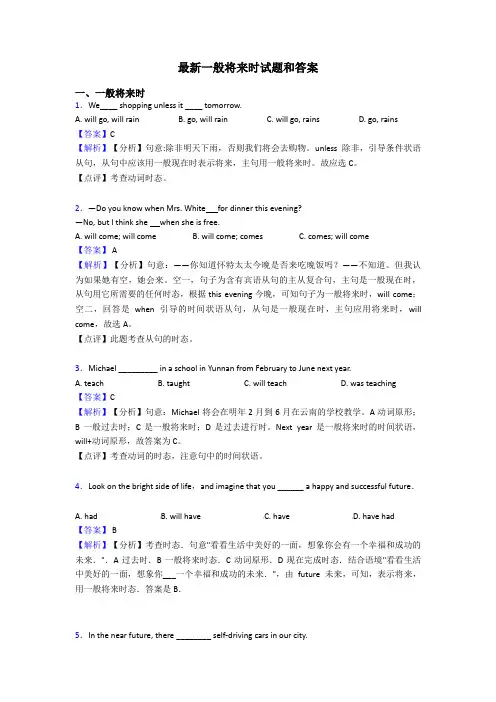
最新一般将来时试题和答案一、一般将来时1.We____ shopping unless it ____ tomorrow.A. will go, will rainB. go, will rainC. will go, rainsD. go, rains【答案】C【解析】【分析】句意:除非明天下雨,否则我们将会去购物。
unless 除非,引导条件状语从句,从句中应该用一般现在时表示将来,主句用一般将来时。
故应选C。
【点评】考查动词时态。
2.—Do you know when Mrs. White for dinner this evening?—No, but I think she when she is free.A. will come; will comeB. will come; comesC. comes; will come【答案】 A【解析】【分析】句意:——你知道怀特太太今晚是否来吃晚饭吗?——不知道。
但我认为如果她有空,她会来。
空一,句子为含有宾语从句的主从复合句,主句是一般现在时,从句用它所需要的任何时态,根据this evening今晚,可知句子为一般将来时,will come;空二,回答是when引导的时间状语从句,从句是一般现在时,主句应用将来时,will come,故选A。
【点评】此题考查从句的时态。
3.Michael _________ in a school in Yunnan from February to June next year.A. teachB. taughtC. will teachD. was teaching【答案】C【解析】【分析】句意:Michael将会在明年2月到6月在云南的学校教学。
A动词原形;B一般过去时;C是一般将来时;D是过去进行时。
Next year是一般将来时的时间状语,will+动词原形,故答案为C。
【点评】考查动词的时态,注意句中的时间状语。

一般将来时练习题(含答案)一、一般将来时1.Robots more heavy work for us in the future.A. will doB. didC. have doneD. were doing【答案】A【解析】【分析】句意:在将来, 机器人将为我们做更多繁重的工作。
根据in the future 可知此处用一般将来时, 故选A。
【点评】一般将来时2.—Have you watched the new movie Kung Fu Panda 3, Kelly?—Not yet. I _____ it with my classmate tonight.A. will watchB. was watchingC. have watched【答案】A【解析】【分析】句意:—凯莉,你看过新电影《功夫熊猫3》吗?—还没有呢。
今天晚上我要和我的同学一起去看。
A. will watch一般将来时态形式;B. was watching过去进行时态形式;C. have watched现在完成时态形式。
本句描述的是今天晚上将要发生的动作,句子用一般将来时态。
故选A。
【点评】本题考查时态辨析。
以及will watch;was watching;have watched三种时态的用法和区别3.Michael _________ in a school in Yunnan from February to June next year.A. teachB. taughtC. will teachD. was teaching【答案】C【解析】【分析】句意:Michael将会在明年2月到6月在云南的学校教学。
A动词原形;B一般过去时;C是一般将来时;D是过去进行时。
Next year是一般将来时的时间状语,will+动词原形,故答案为C。
【点评】考查动词的时态,注意句中的时间状语。
4.— Excuse me. Could you tell me ?— It will leave at 4:00 p.m.A. how will you go to ShanghaiB. how you will go to ShanghaiC. when the bus would leave for ShanghaiD. when the bus will leave for Shanghai【答案】 D【解析】【分析】这是一道根据回答写出问句所缺成分的题目,阅题时要仔细分析回答的句子。
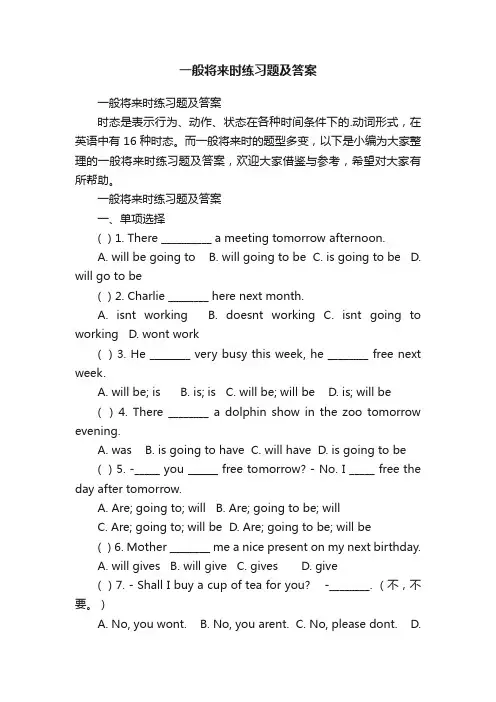
一般将来时练习题及答案一般将来时练习题及答案时态是表示行为、动作、状态在各种时间条件下的.动词形式,在英语中有16种时态。
而一般将来时的题型多变,以下是小编为大家整理的一般将来时练习题及答案,欢迎大家借鉴与参考,希望对大家有所帮助。
一般将来时练习题及答案一、单项选择( ) 1. There __________ a meeting tomorrow afternoon.A. will be going toB. will going to beC. is going to beD. will go to be( ) 2. Charlie ________ here next month.A. isnt workingB. doesnt workingC. isnt going to workingD. wont work( ) 3. He ________ very busy this week, he ________ free next week.A. will be; isB. is; isC. will be; will beD. is; will be( ) 4. There ________ a dolphin show in the zoo tomorrow evening.A. wasB. is going to haveC. will haveD. is going to be( ) 5. -_____ you ______ free tomorrow? - No. I _____ free the day after tomorrow.A. Are; going to; willB. Are; going to be; willC. Are; going to; will beD. Are; going to be; will be( ) 6. Mother ________ me a nice present on my next birthday.A. will givesB. will giveC. givesD. give( ) 7. - Shall I buy a cup of tea for you? -________. (不,不要。
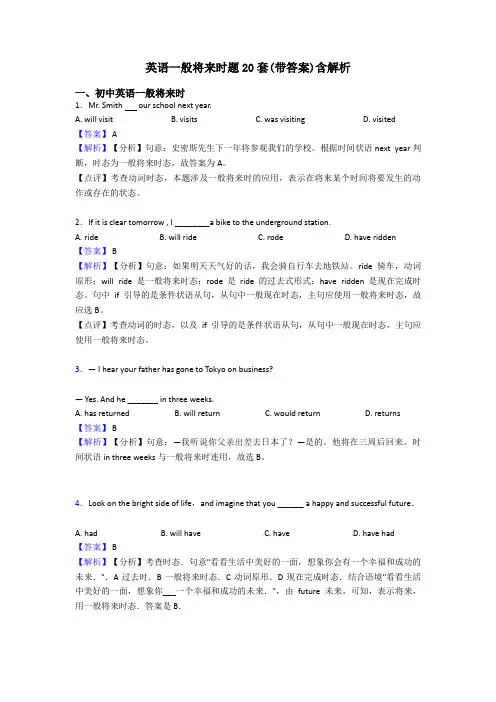
英语一般将来时题20套(带答案)含解析一、初中英语一般将来时1.Mr. Smith our school next year.A. will visitB. visitsC. was visitingD. visited【答案】 A【解析】【分析】句意:史密斯先生下一年将参观我们的学校。
根据时间状语next year判断,时态为一般将来时态,故答案为A。
【点评】考查动词时态,本题涉及一般将来时的应用,表示在将来某个时间将要发生的动作或存在的状态。
2.If it is clear tomorrow , I ________a bike to the underground station.A. rideB. will rideC. rodeD. have ridden【答案】 B【解析】【分析】句意:如果明天天气好的话,我会骑自行车去地铁站。
ride骑车,动词原形;will ride是一般将来时态;rode是ride的过去式形式;have ridden是现在完成时态。
句中if引导的是条件状语从句,从句中一般现在时态,主句应使用一般将来时态,故应选B。
【点评】考查动词的时态,以及if引导的是条件状语从句,从句中一般现在时态,主句应使用一般将来时态。
3.— I hear your father has gone to Tokyo on business?— Yes. And he _______ in three weeks.A. has returnedB. will returnC. would returnD. returns【答案】 B【解析】【分析】句意:—我听说你父亲出差去日本了?—是的。
他将在三周后回来。
时间状语in three weeks与一般将来时连用,故选B。
4.Look on the bright side of life,and imagine that you ______ a happy and successful future.A. hadB. will haveC. haveD. have had【答案】 B【解析】【分析】考查时态.句意"看看生活中美好的一面,想象你会有一个幸福和成功的未来.".A过去时.B一般将来时态.C动词原形.D现在完成时态.结合语境"看看生活中美好的一面,想象你___一个幸福和成功的未来.",由future未来,可知,表示将来,用一般将来时态.答案是B.5.—Excuse me,could you please tell me if the meeting ________ on time?—If it ________ tomorrow,we'll have to put it off.A. will hold; snowsB. will be held; snowsC. will be held; snowD. holds; will snow 【答案】B【解析】【分析】句意:—打扰了,请你告诉我会议是否准时举行好吗?—如果明天下雪,我们只好推迟了。
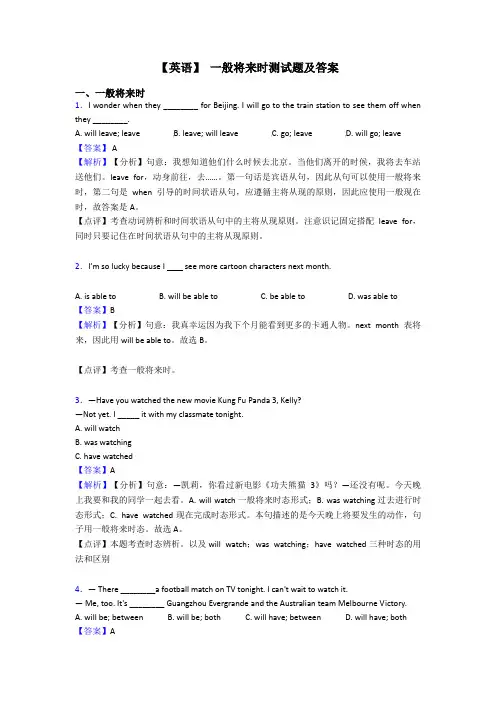
【英语】一般将来时测试题及答案一、一般将来时1.I wonder when they ________ for Beijing. I will go to the train station to see them off when they ________.A. will leave; leaveB. leave; will leaveC. go; leaveD. will go; leave【答案】 A【解析】【分析】句意:我想知道他们什么时候去北京。
当他们离开的时候,我将去车站送他们。
leave for,动身前往,去……。
第一句话是宾语从句,因此从句可以使用一般将来时,第二句是when引导的时间状语从句,应遵循主将从现的原则,因此应使用一般现在时,故答案是A。
【点评】考查动词辨析和时间状语从句中的主将从现原则。
注意识记固定搭配leave for,同时只要记住在时间状语从句中的主将从现原则。
2.I’m so lucky because I see more cartoon characters next month.A. is able toB. will be able toC. be able toD. was able to【答案】B【解析】【分析】句意:我真幸运因为我下个月能看到更多的卡通人物。
next month表将来,因此用will be able to。
故选B。
【点评】考查一般将来时。
3.—Have you watched the new movie Kung Fu Panda 3, Kelly?—Not yet. I _____ it with my classmate tonight.A. will watchB. was watchingC. have watched【答案】A【解析】【分析】句意:—凯莉,你看过新电影《功夫熊猫3》吗?—还没有呢。
今天晚上我要和我的同学一起去看。
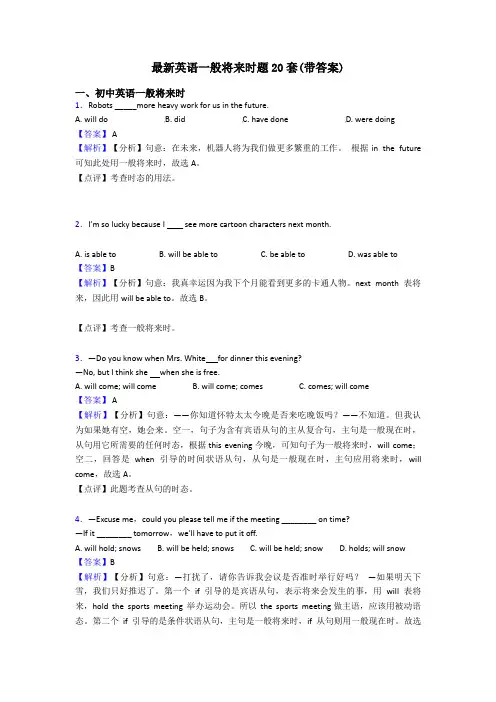
最新英语一般将来时题20套(带答案)一、初中英语一般将来时1.Robots _____more heavy work for us in the future.A. will doB. didC. have doneD. were doing【答案】 A【解析】【分析】句意:在未来,机器人将为我们做更多繁重的工作。
根据in the future 可知此处用一般将来时,故选A。
【点评】考查时态的用法。
2.I’m so lucky because I see more cartoon characters next month.A. is able toB. will be able toC. be able toD. was able to【答案】B【解析】【分析】句意:我真幸运因为我下个月能看到更多的卡通人物。
next month表将来,因此用will be able to。
故选B。
【点评】考查一般将来时。
3.—Do you know when Mrs. White for dinner this evening?—No, but I think she when she is free.A. will come; will comeB. will come; comesC. comes; will come【答案】 A【解析】【分析】句意:——你知道怀特太太今晚是否来吃晚饭吗?——不知道。
但我认为如果她有空,她会来。
空一,句子为含有宾语从句的主从复合句,主句是一般现在时,从句用它所需要的任何时态,根据this evening今晚,可知句子为一般将来时,will come;空二,回答是when引导的时间状语从句,从句是一般现在时,主句应用将来时,will come,故选A。
【点评】此题考查从句的时态。
4.—Excuse me,could you please tell me if the meeting ________ on time?—If it ________ tomorrow,we'll have to put it off.A. will hold; snowsB. will be held; snowsC. will be held; snowD. holds; will snow 【答案】B【解析】【分析】句意:—打扰了,请你告诉我会议是否准时举行好吗?—如果明天下雪,我们只好推迟了。
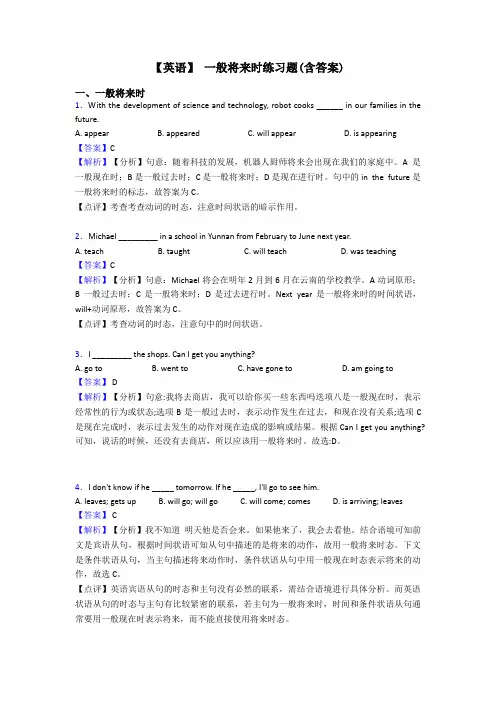
【英语】一般将来时练习题(含答案)一、一般将来时1.With the development of science and technology, robot cooks ______ in our families in the future.A. appearB. appearedC. will appearD. is appearing【答案】C【解析】【分析】句意:随着科技的发展,机器人厨师将来会出现在我们的家庭中。
A是一般现在时;B是一般过去时;C是一般将来时;D是现在进行时。
句中的in the future是一般将来时的标志,故答案为C。
【点评】考查考查动词的时态,注意时间状语的暗示作用。
2.Michael _________ in a school in Yunnan from February to June next year.A. teachB. taughtC. will teachD. was teaching【答案】C【解析】【分析】句意:Michael将会在明年2月到6月在云南的学校教学。
A动词原形;B一般过去时;C是一般将来时;D是过去进行时。
Next year是一般将来时的时间状语,will+动词原形,故答案为C。
【点评】考查动词的时态,注意句中的时间状语。
3.I _________ the shops. Can I get you anything?A. go toB. went toC. have gone toD. am going to【答案】 D【解析】【分析】句意:我将去商店,我可以给你买一些东西吗迭项八是一般现在时,表示经常性的行为或状态;选项B是一般过去时,表示动作发生在过去,和现在没有关系;选项C 是现在完成时,表示过去发生的动作对现在造成的影响或结果。
根据Can I get you anything?可知,说话的时候,还没有去商店,所以应该用一般将来时。
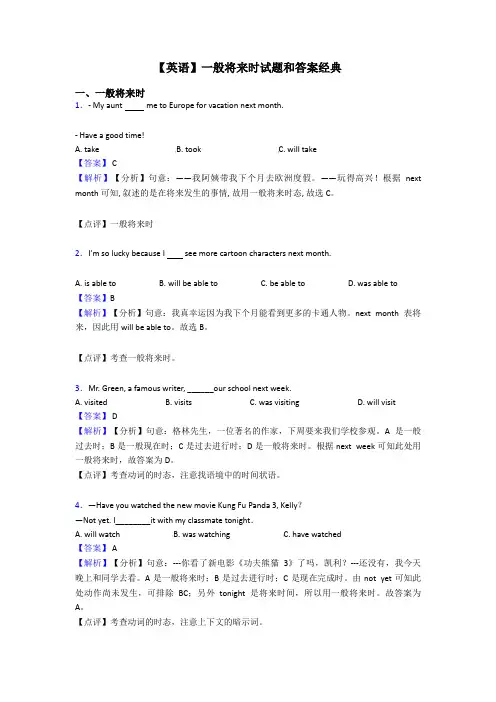
【英语】一般将来时试题和答案经典一、一般将来时1.- My aunt me to Europe for vacation next month.- Have a good time!A. takeB. tookC. will take【答案】 C【解析】【分析】句意:——我阿姨带我下个月去欧洲度假。
——玩得高兴!根据next month可知, 叙述的是在将来发生的事情, 故用一般将来时态, 故选C。
【点评】一般将来时2.I’m so lucky because I see more cartoon characters next month.A. is able toB. will be able toC. be able toD. was able to【答案】B【解析】【分析】句意:我真幸运因为我下个月能看到更多的卡通人物。
next month表将来,因此用will be able to。
故选B。
【点评】考查一般将来时。
3.Mr. Green, a famous writer, ______our school next week.A. visitedB. visitsC. was visitingD. will visit【答案】 D【解析】【分析】句意:格林先生,一位著名的作家,下周要来我们学校参观。
A是一般过去时;B是一般现在时;C是过去进行时;D是一般将来时。
根据next week可知此处用一般将来时,故答案为D。
【点评】考查动词的时态,注意找语境中的时间状语。
4.—Have you watched the new movie Kung Fu Panda 3, Kelly?—Not yet. I________it with my classmate tonight.A. will watchB. was watchingC. have watched【答案】 A【解析】【分析】句意:---你看了新电影《功夫熊猫3》了吗,凯利?---还没有,我今天晚上和同学去看。

一般将来时练习题(含答案)经典一、一般将来时1.— I hear Leo will leave for Korea for a meeting.— Really? Do you know when he _______.A. will startB. to startC. started【答案】 A【解析】【分析】句意:——我听说Leo要去韩国开会。
——真的吗?你知道他什么时候出发吗?when何时,此处询问将来的时间,故用一般将来时,因此选A。
【点评】考查动词的时态。
2.I don't know whether mom _________ me to Beijing next week.A. takeB. takesC. will takeD. would take【答案】 C【解析】【分析】句意:我不知道妈妈下周是否会带我去北京。
分析句子结构可知,此处是宾语从句,主句时态为一般现在时,从句时态根据主现从任原则,再根据从句中的next week可知,从句应该是表示将来的动作,所以用一般将来时,用will do形式,故选C。
【点评】考查宾语从句时态。
注意宾语从句时态的主现从任原则。
3.I’m so lucky because I see more cartoon characters next month.A. is able toB. will be able toC. be able toD. was able to【答案】B【解析】【分析】句意:我真幸运因为我下个月能看到更多的卡通人物。
next month表将来,因此用will be able to。
故选B。
【点评】考查一般将来时。
4.Look on the bright side of life,and imagine that you ______ a happy and successful future.A. hadB. will haveC. haveD. have had【答案】 B【解析】【分析】考查时态.句意"看看生活中美好的一面,想象你会有一个幸福和成功的未来.".A过去时.B一般将来时态.C动词原形.D现在完成时态.结合语境"看看生活中美好的一面,想象你___一个幸福和成功的未来.",由future未来,可知,表示将来,用一般将来时态.答案是B.5.We ________ a party for Kate. It's supposed to be a surprise.A. were havingB. hadC. will haveD. have had【答案】C【解析】【分析】句意:我们将为凯特举办一个聚会。
(英语)英语一般将来时题20套(带答案)含解析一、单项选择一般将来时1.The project to developing the economy and reducing poverty when it is completed. A.has contributed B.had been contributedC.will contribute D.is contribute【答案】C【解析】试题分析:考查动词的时态。
句意:这项工程在竣工后,将会继续发展经济,减少贫穷。
根据句意可知表示将要发生的事情,用一般将来时,选C考点 : 考查动词的时2.As you go through this book, you ________ that each of the millions of people who lived through World War II had a different experience.A.will find B.foundC.had found D.have found【答案】A【解析】试题分析:一般将来时表示将要发生的动作或情况。
在一般将来时的句子中,有时有表示将来时间的状语,有时没有时间状语,这时要从意思上判断是否指未来的动作或情况。
句意:当你通读这本书的时候,你将会发现成千上万的经历过二战的每个人都有不同的经历。
根据句意,判断主语的时态为一般将来时,故选A【考点定位】考查时态。
3.---Do you have any special plan for this weekend?---Yes. I _____ my daughter to Disneyland.A.am going to take B.take C.have taken D.would take【答案】A【解析】试题分析:考查时态。
根据句中的时间状语this weekend,可以判断用将来时。
英语中经常用现在进行时代替将来时。
(英语)英语一般将来时练习题20篇含解析一、单项选择一般将来时1.(东北三校一模)I am certain by no means ________ his word since he has promised an amount of money to the poor.A.he will break B.will he breakC.broke D.did he break【答案】B【解析】B句意:我确信既然他答应捐一笔钱给穷人,他绝不会食言的。
by no means(绝不)为表示否定意义的介词短语,置于句首时,其后面的主谓语要倒装,根据句意可知设空处需用一般将来时,故答案为B项。
2.Close the door of fear behind you, and you ______ the door of faith open before you. A.will see B.have seenC.are seeing D.Saw【答案】A【解析】试题分析:句意:关掉你身后的恐惧之门,你就能看到你前面敞开的信念之门。
祈使句的句型:动词原形+ and you will表示并列,动词原形+ or you will表示转折。
A. will see 一般将来时 B. have seen现在完成时 C. are seeing 现在进行时D. saw一般过去时。
根据祈使句的句型特点,故选A。
考点:考查祈使句和动词时态的用法。
3.If you _____ his wife’s income____ his own,the total of their income _____ 3000 yuan. A.add; to; will add up to B.add; to; adds toC.add up; to; adds up to D.will add; for; adds up【答案】A【解析】试题分析:考查if引导条件状语从句及词的用法。
小升初英语语法知识专项练习一般将来时一、单项选择1.I’m going ________ the bookshop.A.is B.to C./ 2.Where are you _______?A.going B.look C.want 3.—What are they _______?—They're going to watch TV.A.going B.doing C.going to do 4.—What are you going to do?—________A.She’s going to run every day.B.He’s going to go home. C.We’re going to run in the park.5.Robin and I ________ read a poem.A.am going to B.is going to C.are going to 6.They are going ________ a match with their friends next week. A.have B.having C.to have 7.What will you ___________ this Sunday?A.on B.do C.doing8.I'm going ______ a tree tomorrow.A. plantB. to plantC. plants 9.We’re going to ______ the zoo on Sunday.A.visiting B.visit C.visited10.There __________ a sports meeting in the playground next Monday.A. is going to haveB. will haveC. is going to be 11.If you _________ work hard, you _________ pass the exam.A. won't, won'tB. won't, can'tC. don't, don'tD. don't, won't 12.What are you ________ to do this afternoon?A.going B.go C.goes 13.Daming and Si mon ____ to America next year.A. goesB. aregoing C. went D. go14.We are going _______.A.seeing ducks B.to see ducks C.to see duck 15.We ______have a football match tomorrow.A. are goingB. are go toC. are going to 16.—______ are they going to____ tomorrow?—They are going to have a party.A.When; doB.What; goC.What; do17.________ you pick peaches?A.Will B.Are C.Is18.—What are you going to do on Saturday?—________A.I’m going to see my grandparents.B.I see my grandparents. 19.Xiaoyong is going to ________ in the park.A.running B.run C.runs20.Mary is going to check her email ________.21.What are you ________ to buy this afternoon?A.going B.go C.goes22.I _______ buy a new hat.A.be going to B.going to C.am going D.am going to 23.I’m ________ the bookstore this afternoon ________ bus.A.going; by B.going; by a C.going to; by D.go to; in a 24.My family _______ going to get together this evening.A.are B.will C.am25.I'm going to buy a comic book ________.A.on Sundays B.next week C.yesterday 26.The friend s in Grade 6 _______ going to say goodbye.A.is B.are C.will27.I’m _________ to bring back some sausages for you!A.going B.goes C.go28.She is going to take a trip ________.A.next week B.yesterday C.last Friday 29.What ________ you ________ to do this afternoon?A.are; going B.do; do C.about; go 30.—When are you going to the Summer Palace?—________A.Three days ago. B.This afternoon. C.Every Sunday. D.Last year. 31.I am _______ eat breakfast at 7:15.A.going to B.will C.to D.for32.I _____ the Great Wall next year.A.go to visit B.will visit C.visited33.—Where are you going this afternoon?—________.A.I'm doing my homework B.I'm going to the bookstoreC.I'm going there by bike34.—Where is Tom going?—He ______ the shop.A.is going B.is going to C.is go to35.—_______ be hot?—Yes, _______.A.W ill; is it B.Will it; it will C.Will; it won't D.Will it; it is 36.Jill ________ wear glasses in the future.A.won’t B.doesn’t C.isn’t37.In the future, the computers ________ us see dinosaurs in class.A.help B.helped C.will help D.to help38.The Chinese space station ________ ready in 2022.A.will be B.gets39.I’m going to swim ______.A.now B.yesterday C.tomorrow40.________ you going to run?A.Are B.Is C.Do41.—________ are you going to do?—I’m going to swim.A.Who B.What C.Where42.—What's the weather _______ like in Xi'an?—It will be snowy.A.is going to be B.go to be C.going to be43.They will _______ the dining room.A.decorating B.decorates C.decorate44.How are you ________ celebrate?A.go to B.going to C.will to D./45.— your father you to the park tomorrow?—Yes, tomorrow is Sunday.A. Do, takeB. Did, takeC. Will, take46.We’re going ________ visit them.A.to B.too C.two47.—What are you going to do this afternoon?—________.A.I'm going to buy a book B.I'm a student C.I'm going to school by bike 48.—Where are you going this afternoon?—________A.I’m going to buy some books.B.I’m going to the bookstore.C.Can I help you? D.I’m going to visit my aunt.49.It will ______ in Beijing.A.be sunny B.sun C.sunning50.—Where ______ you ______?—I am going home.A.are; go B.are; going C.are; do一般将来时(参考答案)一、单项选择1.【答案】B【解析】句意:我将要去书店。
英语一般将来时题20套(带答案)一、初中英语一般将来时1.- Do you have any plans for tonight?- Yes, I at the new Italian restaurant in town.A. eatB. have eatenC. ateD. am going to eat【答案】 D【解析】【分析】句意:——你今晚有什么计划吗? ——是的, 我打算在镇上新开的意大利饭馆吃饭。
根据句中的时间词“tonight”判断此句应是一般将来时, 结构:am/is/are+ going to do; will do.故直接选D即可。
【点评】一般将来时2.— There ________a football match on TV tonight. I can't wait to watch it.— Me, too. It's ________ Guangzhou Evergrande and the Australian team Melbourne Victory.A. will be; betweenB. will be; bothC. will have; betweenD. will have; both【答案】A【解析】【分析】句意为:---今晚将有一场电视直播足球比赛,我非常想看。
---我也是。
这是广州恒达足球俱乐部与澳大利亚墨尔本足球俱乐部之间的比赛。
根据语境,这是there be结构的一般将来时,应用there will be;both指两者,between指两者之间。
故选A。
【点评】考查there be结构以及词语辨析。
3.I _________ the shops. Can I get you anything?A. go toB. went toC. have gone toD. am going to【答案】 D【解析】【分析】句意:我将去商店,我可以给你买一些东西吗迭项八是一般现在时,表示经常性的行为或状态;选项B是一般过去时,表示动作发生在过去,和现在没有关系;选项C 是现在完成时,表示过去发生的动作对现在造成的影响或结果。
一般将来时题目20道含答案1.What time ____________ (you / finish) work tomorrow?–Ans: will you finish2.She ____________ (go) to a concert next week.–Ans: will go3.By this time next year, he ____________ (study) Mandarin for five years.–Ans: will have studied4.They ____________ (not / be) late for the meeting.–Ans: will not be5.____________ (you / see) her at the party tonight?–Ans: Will you see6.I am not sure, but I think she ____________ (be) there later.–Ans: will be7.He ____________ (travel) to Japan next month for a business trip.–Ans: will travel8.We ____________ (have) a meeting at 10 o’clock tomorrow morning.–Ans: will have9.They ____________ (not / play) tennis with us this weekend.–Ans: will not play10.____________ (she / come) to the party if she is invited?–Ans: Will she come11.I promise I ____________ (return) the book to you tomorrow.–Ans: will return12.Tomorrow, he ____________ (start) his new job as a manager.–Ans: will start13.Don’t worry, I ____________ (meet) you at the airport.–Ans: will meet14.____________ (they / go) to the beach on Sunday?–Ans: Will they go15.By this time next year, they ____________ (live) in a different city.–Ans: will have lived16.Our team ____________ (win) the championship if we play well.–Ans: will win17.They ____________ (not / have) enough time to complete the project.–Ans: will not have18.Will he ____________ (call) you later?–Ans: call19.We ____________ (not / see) each other again after today.–Ans: will not see20.By the time they arrive, we ____________ (prepare) everything for theparty.–Ans: will have prepared以上是一般将来时的20个练习题及答案。